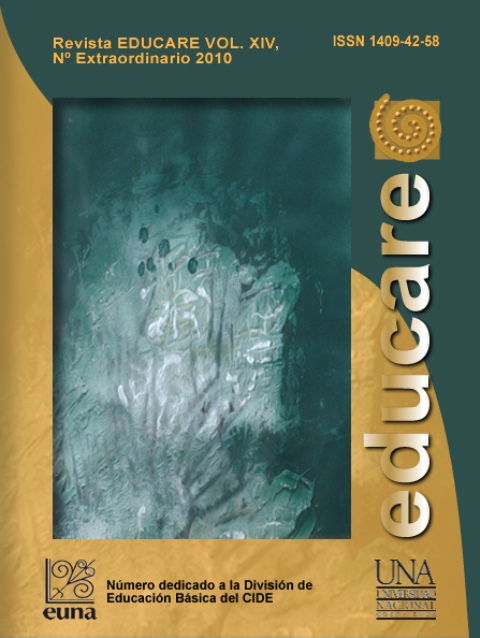The Support Educational Commitee Participation in the Pedagogical Approach of an Educational Integration
DOI:
https://doi.org/10.15359/ree.14-Ext.9Keywords:
committee of educational support, inclusive education and educational needsAbstract
Educational services are essential to social and economical development of people, mainly to the progress of all sectors of society. Establishing actions that can promote the participation of various social groups is essential to improve their quality of life and building more respectful and fair human rights without any discrimination or exclusion.
In recent years, the Costa Rican education system has undergone significant changes due to the pedagogical approach of inclusive education in which students with educational needs may require different support and specialized resources for training and development.
For this, the Basic Educational Division of the Center for Teaching and Research in Education, generated a concern of investigating the participation of the Committee of Educational Support in the process of educational integration, thus, determine the functions performed in the educational context, under the rules of the 7600 Equal Opportunity Act for people with disabilities, which is the entity that corresponds to regulate access to education by identifying the support required for students with educational needs and, advice and trains, administrative staff in schools both public and private in the country.
In addition, there is also a concern for exploring the role of the Special Education teacher for this Committee, as well as learning the perceptions of teachers and parents about the functions performed by the committee.
References
Aguilar, A. (2002). De la integración a la inclusividad. La atención de la diversidad pilar básico
en la escuela del siglo XX. Buenos Aires: Espacio.
Aguilar, G. (2004). Del exterminio a la educación inclusiva: Una visión desde la discapacidad.
Conferencia presentada en el V Congreso Educativo Internacional: De la educación tradicional
a la educación inclusiva. Heredia: Universidad Interamericana de Costa Rica.
Aguilar, G, y Monge, G. (2008) La Educación Especial en Costa Rica: antecedentes, evolución,
nuevas tendencias y desafíos. San José: Ministerio de Educación Pública. Versión preliminar
sin publicar.
Asesoría de Educación Especial de Heredia. (2006). Resumen cuantitativo Regional.
Acciones de Equipo Regional itinerante 2002-2006. Heredia. Ministerio de
Educación Pública.
Barrantes, R. (2000). Investigación: un camino al conocimiento, un enfoque cualitativo y cuantitativo.
San José: Editorial Universidad Estatal a Distancia.
Blanco, R. (2001). Las necesidades educativas especiales en la escuela ordinaria. Madrid:
Ministerio de Educación y Comercio.
Centro Nacional de Recursos para la Inclusión Educativa [CENAREC]. (2005). Adecuaciones
de Acceso al Currículo. Inducción a Equipos de Investigación. San José: Material sin
publicar.
Costa Rica. Asamblea Legislativa. (2008) Convención sobre los Derechos Humanos de las Personas
con Discapacidad. San José: La Gaceta N° 187 Imprenta Nacional.
Costa Rica. Ministerio de Educación Pública. (1998). Ley 7600 Igualdad de Oportunidades para
las personas con discapacidad y su Reglamento. San José: CENAREC.
Costa Rica. Ministerio de Educación Pública (2005). Políticas, Normativa y Procedimientos para el
Acceso a la Educación de los estudiantes con Necesidades Educativas Especiales San José:
CENAREC.
Fontana, A., Espinoza, A. y León, H. (2009). Implementación de las adecuaciones de acceso al
currículos en las instituciones educativas costarricenses. San José: CENAREC.
Hernández, R.; Fernández, C. y Baptista, P. (2006). Metodología de la investigación. México:
Editorial Mc Graw Hill.
Meléndez, L. (2005). La educación especial en Costa Rica: fundamentos y evolución. San José:
Universidad Estatal a Distancia.
Organización de las Naciones Unidas para la Educación la Ciencia y la Cultura [UNESCO]. (2000).
Marco de Acción de Dakar. Educación para Todos: cumplir nuestros compromisos comunes.
Consultado el 7 Julio, 2010 de http://www.unesco.go.cr/marcodeaccion/2000/dakar/
Sánchez, A. y Torres, J. (2002) Educación Especial. Centros educativos y profesores ante la
diversidad. Madrid: Ediciones Pirámide.
Zúñiga, E. (2002). Las adecuaciones curriculares en la universidad: un derecho y una responsabilidad
impostergable. En R. Jiménez (Ed.), Las personas con discapacidad en la Educación
Superior. (Una propuesta para la Diversdad e Igualdad) (pp. 141-153). San José: Fundación
Justicia y Género.
Downloads
Published
How to Cite
Issue
Section
License
1. In case the submitted paper is accepted for publication, the author(s) FREELY, COSTLESS, EXCLUSIVELY AND FOR AN INDEFINITE TERM transfer copyrights and patrimonial rights to Universidad Nacional (UNA, Costa Rica). For more details check the Originality Statement and Copyright Transfer Agreement
2. REUTILIZATION RIGHTS: UNA authorizes authors to use, for any purpose (among them selfarchiving or autoarchiving) and to publish in the Internet in any electronic site, the paper´'s final version, both approved and published (post print), as long as it is done with a non commercial purpose, does not generate derivates without previous consentment and recognizes both publisher's name and authorship.
3. The submission and possible publication of the paper in the Educare Electronic Journal is ruled by the Journal’s editorial policies, the institutional rules of Universidad Nacional and the laws of the Republic of Costa Rica. Additionally, any possible difference of opinion or future dispute shall be settled in accordance with the mechanisms of Alternative Dispute Resolution and the Costa Rican Jurisdiction.
4. In all cases, it is understood that the opinions issued are those of the authors and do not necessarily reflect the position and opinion of Educare, CIDE or Universidad Nacional, Costa Rica. It is also understood that, in the exercise of academic freedom, the authors have carried out a rogorous scientific-academic process of research, reflection and argumentation thar lays within the thematic scope of interest of the Journal.
5. The papers published by Educare Electronic Journal use a Creative Commons License:














 The articles published by Educare Electronic Journal can be shared with a Creative Commons License:
The articles published by Educare Electronic Journal can be shared with a Creative Commons License: 



